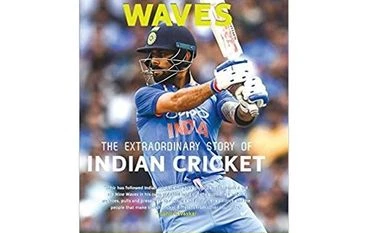India has won the World Cup twice, in 1983 and 2011. It has also won the T20 championship once in 2007 — after resisting the format for several years rather as a former chairman of the State Bank of India had resisted ATMs in the 1980s. For the last few years, India has been at or near the top of all the cricket charts. Finally, commercially, too, it is to world cricket what China is to world trade: A very rich bully.
Mihir Bose, a highly respected journalist and author, tries to explain what has brought about this ascendancy in The Nine Waves:The Extraordinary Story of Indian Cricket. After all, as historian Prashant Kidambi shows in his forthcoming book about the first Indian tour of England in 1911, that team was treated as a bunch of wannabe natives. It lost every match it played, of course.
Mr Bose, who had earlier written The History of Indian Cricket, revisits that history and comes up with a new theory: Indian cricket has seen nine waves each taller than the previous one and each scaling a new peak. He doesn’t quite tell us what constitutes a “wave” but no matter. The book is so rich in detail that even the most ardent follower of the game will be left wonderstruck.
So, although normally I give away cricket books after reading them, I am going to keep this one. It’s the sort of book you keep dipping into for the anecdotes such as the one about the daughter of the Bombay jeweller who, after he had scored a century in 1932, went to see Lala Amarnath with a bagful of diamonds and asked if he would elope with her. Mr Amarnath declined. He told Mr Bose in an interview that she was not “his type”.
Nehru does his bit
Jawaharlal Nehru was a great man, with a Modi-like eye on symbolism. That’s why every year there was his photograph in Indian newspapers in pads for the yearly Parliamentarian match. Nehru thought cricket was a good idea.
But therein hangs a tale. It seems the Brits — Winston Churchill and Clement Attlee — were keen that India should retain the British king as its constitutional head. Bose says even some sort of ancient Indian title for him was suggested. Sardar Patel, however, didn’t want India to be a part of this British club and there was a lot of debate about it in 1948.
Then, typically, for reasons best known to himself, Nehru took a unilateral decision: We are in. Mr Bose suggests that Edwina Mountbatten might have had something to do with it. By all accounts, Nehru seems to have had soft corner for her. The future of Indian cricket, however, must have been the last thing on Nehru’s mind.
His decision was momentous as the Imperial Cricket Conference (as the ICC was called then), decided to make India a permanent member, a privilege from which many things flowed and followed. At the very least, India could now dine at the High Table. Today, it rules the ICC, which no longer sits in London but in Dubai!
Mr Bose asks an interesting question in this regard. It is supremely fit for discussion after a few drinks: Would hockey, in which India was unparalleled then, prospered if Nehru had decided to accept Patel’s recommendation not to be a member of the Commonwealth?
This can only be answered properly if the drink is scotch — and never, it goes without saying, that strange Indian bureaucratic drink called IMFL.
More Nehru
Broadly this book can be read in two parts: Pre-2001 and post 2001. The reason: Before 2001, cricket lore and controversies were not covered as extensively as they are now. So, there are many stories Mr Bose tells which, if not new, are at least not known very widely or remembered.
Chandu Borde was almost made captain in 1961 only to find that Mansoor Ali Khan Pataudi had been chosen. The story goes, says Mr Bose, that Pataudi’s mother, the Begum of Bhopal, asked Nehru to make her son the captain who did his bit.
As with all such stories this one, too, has been in the air on and off but never authenticated, not even by Borde who ruefully told Mr Bose that he had borrowed money from Bapu Nadkarni to celebrate. Borde, I learnt for the first time, was Christian, though why that should have been mentioned beats me.
For the rest of the stories, you will have to read the book, which is needlessly expensive.
The Nine Waves:The Extraordinary Story of Indian Cricket
Mihir Bose
Aleph, 561 pages, Rs 999
Unlock 30+ premium stories daily hand-picked by our editors, across devices on browser and app.
Pick your 5 favourite companies, get a daily email with all news updates on them.
Full access to our intuitive epaper - clip, save, share articles from any device; newspaper archives from 2006.
Preferential invites to Business Standard events.
Curated newsletters on markets, personal finance, policy & politics, start-ups, technology, and more.
)